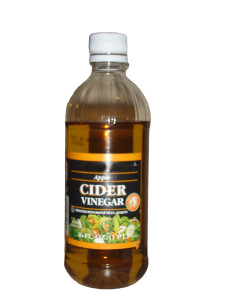 The first vinegar is said to have been created on accident, after grape juice was left to sit out for too long. The juice first turned into wine and then into vinegar, and today the literal meaning of vinegar (in French) is actually “sour wine.”
The first vinegar is said to have been created on accident, after grape juice was left to sit out for too long. The juice first turned into wine and then into vinegar, and today the literal meaning of vinegar (in French) is actually “sour wine.”
Vinegar has been valued since ancient times for its medicinal properties. Even Hippocrates is said to have used it as a wound treatment.[i] There are many different types of vinegar, as it can be made from anything containing sugar (most commonly fruits, rice or wine, for example).
Vinegar is formed when microorganisms, particularly yeasts, change the sugar into alcohol (a process known as alcoholic fermentation). Then “acetobacter” bacteria convert the alcohol into acid (a process known as acetic or acid fermentation).[ii] Apple cider vinegar, as you might suspect, is made using this two-part fermentation process with the juice of apples.
The finished product, what you know as vinegar, is mostly made up of acetic acid, but it also contains a wealth of vitamins (including B vitamins), mineral salts and other beneficial compounds. High-quality brands will also contain “mother,” which looks like a murky film in the vinegar but is actually beneficial strands of enzymes and proteins.
Pasteurized vinegar will not contain the mother, which is why it’s typically recommended to seek out unfiltered, unheated and unpasteurized versions, particularly if you plan to consume it.
19 Awesome Uses for Apple Cider Vinegar
What is apple cider good for? It’s an all-natural health tonic that you can take internally, apply to your skin and hair, and even use to clean your home. The many uses are virtually limitless, but here are some of the best ideas to get you started.[iii]
- Blood sugar support: Two tablespoons of apple cider vinegar before bed may lower blood sugar levels by up to 6 percent in people with type 2 diabetes.[iv]
- Support healthy cholesterol levels: Chlorogenic acid, found in apple cider vinegar, inhibit oxidation of LDL cholesterol and help protect your heart health.[v]
- Weight loss: People who consume vinegar with a high-carb meal consume up to 275 fewer calories for the remainder of the day. This reduction in caloric intake could help you lose 1.5 pounds a month.[vi]
- Sore throat: Gargle with one-third cup of apple cider vinegar mixed with warm water (the vinegar has antibacterial properties).
- Sinus and chest congestion: Add several tablespoons of vinegar to a pot of water then heat until steaming. Carefully inhale the vapor to help break up mucus and clear congestion.
- Toenail fungus: Soak toes in a mixture of one part vinegar to two parts water for 15 minutes. Repeat daily.
- Nausea (morning sickness, queasiness): A mixture of apple cider vinegar, water and a bit of honey may help calm a queasy stomach.
- Sunburn: Gently apply apple cider vinegar to sunburned skin for quick relief.
- Bee and jellyfish stings: Apply apple cider vinegar liberally to soothe irritation and relieve itching.
- Skin irritations: Bug bites, poison ivy and other skin irritations can be calmed by applying apple cider vinegar directly or soaking in a bath with one cup of vinegar added.
- Acid reflux: One tablespoons of unpasteurized, unfiltered vinegar daily may help soothe acid reflux and reduce intestinal spasms.
- Dandruff: After you shampoo, rinse your hair with a solution of ½ cup vinegar and two cups warm water. A weekly rinse of this sort can also help remove product-buildup from your hair.
- Deodorant: Dab a bit of apple cider vinegar under your arms to kill odor-causing bacteria.
- Foot odor: Wiping down your feet with apple cider vinegar will leave them fresh smelling.
- Facial toner: Dab a cotton ball in diluted apple cider vinegar than brush it over your face for a natural toner.
- Remove odors from your home: Set out a bowl of apple cider vinegar to help neutralize odors in your home. You can also use this trick in your fridge (leave the cup of the vinegar in your fridge for at least two days).
- Jewelry cleaner: Drop solid gold jewelry into a cup of apple cider vinegar. Leave submerged for 15 minutes then dry with a cloth.
- Hand cleaner: If your hands are heavily soiled, scrub them with a mixture of cornmeal and apple cider vinegar to remove dirt and stains.
- Household cleaning: Vinegar has countless uses for household cleaning, but typically it’s white distilled vinegar that’s used for this purpose (not apple cider vinegar). For tips on how to incorporate vinegar into your home-cleaning routine, check out How to Remove Grease from Pans … and 14 Other Natural Cleaning Tips.
[i] MedGenMed. 2006; 8(2): 61.
[ii] The Vinegar Institute, FAQs
[iii] The Vinegar Institute, Uses and Tips
[iv] Diabetes Care November 2007 vol. 30 no. 11 2814-2815


I have found that apple cider vinegar helps almost everything or anything that it can be applied to.
VERY USEFUL, AND WELL RESEARCHED INFORMATION UNDERTAKEN by EMINENT & TRAINED SPECIALISTS BEFORE THE PUBLIC IS INFORMED.